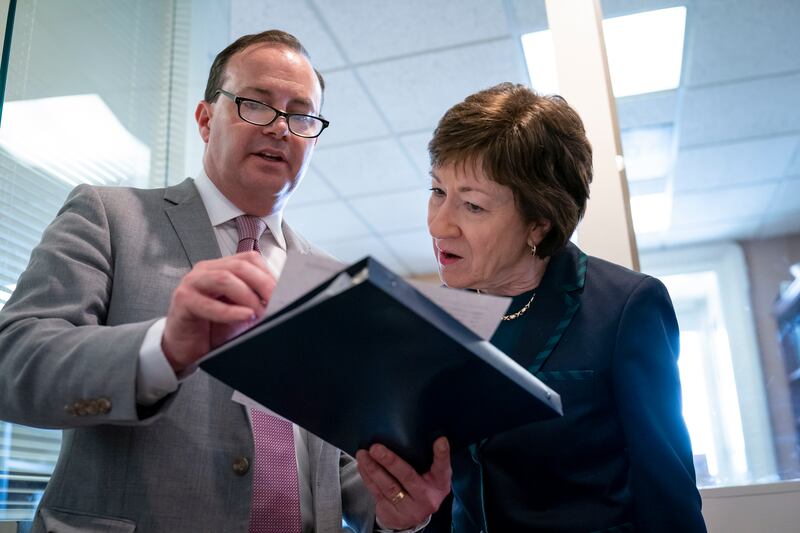Sen. Mike Lee might have found a White House and Congress willing to entertain his long push for federal lawmakers to reclaim power from the president to determine when the country goes to war.
The Utah Republican and Democratic Sen. Chris Murphy, of Connecticut, met with national security adviser Jake Sullivan at the White House on Wednesday about their sweeping bipartisan proposal to overhaul Congress’ role in declaring war, exporting weapons and national emergency declarations. Sen. Bernie Sanders, I-Vt., is also a sponsor of the legislation.
Lee said the senators had a “good exchange” with Sullivan and that he was “very engaging and helpful.”
“There are a lot of things that give me optimism about this bill. We are in a unique time. I can’t think of a better time in modern history ... over the last 50 years when the stars are this well aligned to reform a law in this area,” Lee said after the meeting.
The Constitution gives Congress the power to declare war, but that authority has gradually drifted to the president over the years in both Republican and Democrat administrations.
Part of Lee’s optimism stems, ironically, from President Joe Biden and the Democrat-controlled Congress. The senator is a frequent critic of both.
During his more than three decades in the Senate, Biden repeatedly criticized presidents for deploying troops and attacking U.S. adversaries without congressional consent.
Biden, Lee said, has been a consistent believer in the need to honor the separation of powers in the Constitution, particularly as it relates to war powers. Biden has said the Constitution is clear, and except in response to an attack or the imminent threat of an attack, only Congress may authorize the use of force.
The fact that Biden “served in the Senate, was actively involved in a lot of these issues, had done a lot of thinking about the separation of powers in the war powers context, and is now president” bodes well for overhauling the law, Lee said.
The Biden administration also supports efforts in Congress to repeal the 2002 Authorization for the Use of Military Force that allowed the war in Iraq. That authorization did not expire, nor did the one that allowed the U.S. to fight al-Qaida after the 9/11 attacks.
Lee also said many Democrats in the House and the Senate want reform, and now even a few Republicans.
“Republicans, as a whole, have been a little more resistant in the past to efforts to restrain war power. But for various reasons, including reasons related to the recent withdrawal from Afghanistan, I think you have more Republicans who are more receptive to this kind of thing than they have been in the past,” he said.

The unlikely trio of Lee, Murphy and Sanders dropped a bipartisan bill in July to “reclaim” Congress’ role in national security matters. Though the three disagree on many issues, they have united in resolutions to end U.S. support for the Saudi-led war in Yemen and other military interventions lacking congressional approval.
“President Biden is pulling us out of that, and I commend him for that,” Lee said of Yemen. “But this is the kind of thing that can happen. We get in a little bit, then we get in a little bit more.”
The fact is that we shouldn’t be involving U.S. military personnel in hostilities without congressional authorization, just as Biden has consistently made clear over the years, he said.
The three senators say Congress has over time acquiesced to the growing, often unchecked power of presidents, both Democrat and Republican, to determine the outline of America’s footprint in the world.
“More than ever before, presidents are sending men and women into battle without public debate, and making major policy decisions, like massive arms sales, without congressional input,” Murphy said in introducing the legislation. “Before it’s too late, Congress needs to reclaim its rightful role as co-equal branch on matters of war and national security.”
The senators’ National Security Powers Act would set rules and procedures to reassert and safeguard congressional prerogatives for war powers, arms export and national emergencies. In each case, the president would be required to consult congressional leaders and obtain congressional authorization before exercising powers in those areas. Funding would be cut off after a specified number of days for any action taken without approval of Congress.
The bill has not been heard in a Senate committee hearing. Lee said he and Murphy talked to Sullivan about folding some of its provisions into the National Defense Authorization Act, which is coming up for a vote in the near future.
“We’re looking for any legislative vehicle where we could get some of them into law,” Lee said.



